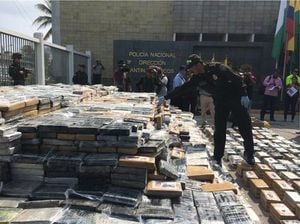Bishop Bruno Leonardo Santos Cerqueira, a prominent religious figure in Brazil, has found himself at the center of a controversy involving alleged suspicious financial transactions linked to his church, the Igreja Batista Avivamento Mundial. The Polícia Federal (PF) and the Ministério Público Federal (MPF) have identified connections between the church and a company tied to Willian Barile Agati, known as the "concierge" of the Primeiro Comando da Capital (PCC), a notorious criminal organization.
With over 50 million followers on YouTube and 9.7 million on Instagram, Bishop Bruno has become one of the most influential religious leaders in the country. His church, based in Salvador, Bahia, has been a focal point of his ministry, attracting large audiences to events, including a recent gathering at the Arena Fonte Nova.
The financial transactions in question were revealed in documents from Operação Mafiusi, an investigation targeting Agati for his alleged involvement in international drug trafficking and money laundering operations. Although the church made transfers totaling R$ 2.2 million to Starway Locação de Veículos, a company flagged for suspicious activity, Bishop Bruno himself is not a target of the investigation.
According to the PF, the transactions occurred over eight months, from August 2021 to April 2022, with seven separate payments made to Starway. However, no invoices were found to justify these payments, raising eyebrows among investigators. The lack of documentation has led to questions regarding the legitimacy of the transactions.
In response to the allegations, Bishop Bruno has vehemently denied any wrongdoing. In a video posted on his social media, he stated, "This does not exist!" and labeled the accusations as a form of persecution and fake news. He emphasized that the church's financial activities were legitimate purchases, asserting that invoices exist to support these claims.
"The police clarified that the church is not under investigation. What happened was that various individuals made purchases from this company, and the church also bought vehicles in 2021. There are documents proving all transactions," he explained. Furthermore, he highlighted other charitable activities, such as a R$ 2 million donation of food to the state of Rio Grande do Sul.
Despite his claims of innocence, the connection to Agati, who has been charged with international drug trafficking and is under investigation for laundering money from cocaine shipments to Europe, has cast a shadow over the bishop's reputation. Agati has earned his nickname for providing logistical support to the PCC and using shell companies for money laundering.
As the investigation unfolds, the public's perception of Bishop Bruno may be affected. He has taken measures to manage his online presence, including blocking comments on his Instagram posts following the release of the PF report. His followers, however, remain largely supportive, as evidenced by the significant viewership of his online content.
Bruno's YouTube channel continues to thrive, with his latest video, featuring a daily prayer, garnering nearly three million views within hours of posting. His ability to connect with his audience remains strong, even in the face of controversy.
While the investigation into Agati and his associates continues, the implications for Bishop Bruno are significant. The church leader's popularity and influence are undeniable, but the scrutiny over financial transactions linked to a criminal organization raises critical questions about transparency and accountability.
As the situation develops, it will be essential for Bishop Bruno to provide clarity regarding the church's finances and its relationship with companies like Starway. His assertion that the church's operations are above board will need to be substantiated with clear evidence to maintain trust among his followers.
In the meantime, the PF and MPF will continue their investigations into Agati and others involved, seeking to uncover the full extent of the alleged money laundering operations connected to the PCC. The outcome of this case could have far-reaching implications not only for those directly involved but also for the broader landscape of religious institutions in Brazil.
As the story unfolds, both supporters and critics of Bishop Bruno will be watching closely, eager to see how he navigates the challenges posed by these serious allegations. The intersection of faith, influence, and legality is a complex terrain, and the bishop's next steps will be pivotal in shaping his legacy.









